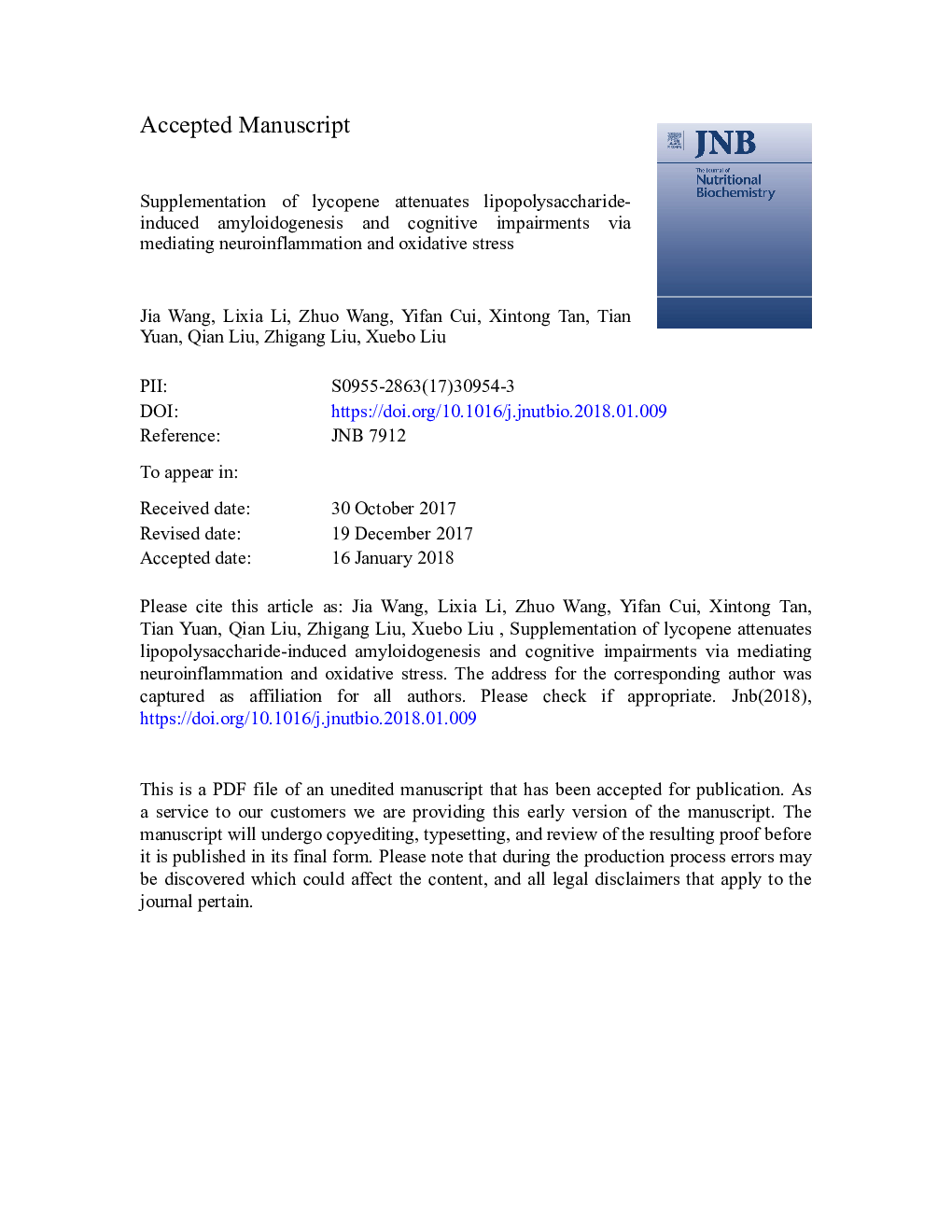| Article ID | Journal | Published Year | Pages | File Type |
|---|---|---|---|---|
| 8336349 | The Journal of Nutritional Biochemistry | 2018 | 39 Pages |
Abstract
Neuroinflammation is documented to be the major culprit of Alzheimer's disease. Lycopene (LYC), a fat soluble carotenoid, exhibits neuroprotective function in several neurodegenerative disorders. However, the effects of LYC to countering systemic inflammation-induced amyloidogenesis and memory deficiency remain to be elucidated. In current study, 3-month-old male C57BL/6J mice were treated with 0.03% LYC (w/w, mixed into normal chow) for 5 weeks. The mice were then treated by intraperitoneal injection of LPS (0.25mg/kg) for 9 days. It was found that LYC inhibited LPS-induced memory loss by behavior tests including Y-maze test and Morris water test. Meanwhile, LYC prevented LPS-induced accumulation of Aβ, levels of amyloid precursor protein (APP), and suppressed neuronal β-secretase BACE1 and elevated the expressions of α-secretase ADAM10. Furthermore, LYC down-regulated the expression of IBA-1 (a marker of microglia activation), reduced the levels of inflammatory mediators and inhibited oxidative stress in LPS-treated mice. Moreover, LYC suppressed the phosphorylation of MAPKs, NFκB, and activated Nrf2 signaling pathways in LPS-treated BV2 microglial cells. Therefore, our study indicated that LYC could ameliorate LPS-induced neuroinflammation, oxidative stress, amyloidogenesis and cognitive impairments possibly through mediating MAPKs, NFκB and Nrf2 signaling pathways, indicating that LYC might be a nutritional preventive strategy in neuroinflammation-related diseases such as AD.
Keywords
LYCBACE1GSHNACCATAβCOX-2JnkiNOSIL-6LPSAPPIL-1βIL-10MMPβ-secretase 1ADAM 10c-Jun N-terminal kinaseERK1/2MAPKNFκBROSamyloid-betaAmyloidogenesisCognitive impairmentsNeuroinflammationIHCImmunohistochemistryInterleukin 10interleukin 6Interleukin-1 betaAlzheimer’s diseaseParkinson’s diseaseOxidative stressCNShematoxylin-eosin stainingSODinducible nitric oxide synthaseSuperoxide dismutasecentral nervous systemCyclooxygenase-2nuclear factor kappa BlipopolysaccharideLycopenematrix metalloproteinaseamyloid precursor proteinmitogen-activated protein kinaseCatalaseExtracellular signal-regulated kinases 1/2GlutathioneReactive oxygen species
Related Topics
Life Sciences
Biochemistry, Genetics and Molecular Biology
Biochemistry
Authors
Jia Wang, Lixia Li, Zhuo Wang, Yifan Cui, Xintong Tan, Tian Yuan, Qian Liu, Zhigang Liu, Xuebo Liu,
